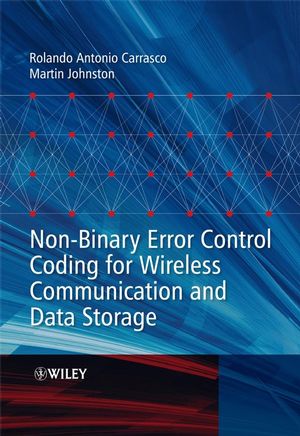Non-Binary Error Control Coding for Wireless Communication and Data StorageISBN: 978-0-470-51819-9
Hardcover
322 pages
January 2009
 |
||||||
Preface
Chapter 1 - Information, Channel Capacity and Channel Modelling
- Introduction
1.2. Measure of Information
1.3. Channel Capacity
1.4 Channel Modelling
1.5. Definition of a communications channel and its parameters
1.6. Multiple Input Multiple Output (MIMO) Channel
1.8. Magnetic Storage Channel Modelling
1.9. Summary
References
Chapter 2 - Basic Principles of Non-Binary Codes
2.1. Introduction to Algebraic Concepts
2.2. Algebraic Geometry
2.3. Conclusions
Chapter 3 - Non-Binary Block Codes
3.1. Introduction
3.2. Fundamentals of Block Codes
3.3. Bose-Chaudhuri-Hocquenghem (BCH) Codes
Example 3.3. Constructing a non-binary BCH code over GF(4) of length n = 15 symbols
3.4. Reed-Solomon Codes
Example 3.4: Constructing a non-binary BCH code over GF(16) of length n = 15 symbols
3.5. Decoding Reed-Solomon Codes
3.6. Coded Modulation
3.7. Conclusions
References
Chapter 4 - Algebraic-Geometric Codes
4.1. Introduction
4.2. Construction of Algebraic-Geometric Codes
4.3. Decoding Algebraic-Geometric Codes
4.4. Majority Voting
4.5. Calculating the Error Magnitudes.
4.6. Complete Hard-Decision Decoding Algorithm for Hermitian Codes.
4.8. Simulation Results
4.9. Conclusions
References
Chapter 5 - List Decoding
5.1. Introduction
5.2. List Decoding of Reed-Solomon Codes using the Guruswami-Sudan algorithm
5.3. Soft-Decision List Decoding of Reed-Solomon codes using the Kötter-Vardy Algorithm.
5.4. List Decoding of Algebraic-Geometric Codes
5.5. Determining the Corresponding Coefficients
5.6. Complexity reduction Interpolation
5.7. General Factorisation
5.8. Soft-Decision List Decoding of Hermitian Codes
5.9. Conclusions
References
Chapter 6 - Non-Binary Low Density Parity Check Codes
6.1. Introduction
6.2. Construction of Binary LDPC Codes – Random and Structured Methods
6.3. Decoding of Binary LDPC Codes using the Belief Propagation Algorithm.
6.4. Construction of Non-Binary LDPC Codes defined over Finite Fields
6.5. Decoding Non-Binary LDPC Codes with the Sum Product Algorithm
6.6.Conclusions
References
Chapter 7 - Non-Binary Convolutional Codes
References
Chapter 8 - Non-binary Turbo codes
8.1. Introduction
8.2. The turbo encoder
8.3. The Turbo Decoder
8.4. Non-Binary Turbo Codes
8.5. Conclusion
References



